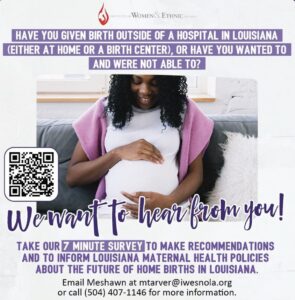
“Demystifying and increasing access to alternative birthing options through policy advocacy”
by Haley Neff
It has been a privilege to elevate and support the voices of mothers seeking alternative birth options who may be stigmatized or discouraged. With the mentorship of a focused and talented leader at IWES, I have helped IWES capture a narrative of why mothers seek and pay for home births, birth center births, doula care and midwifery support, as well as many of the advantages of these services.
Throughout the project on alternative birthing services, I’ve learned just a snapshot about Louisiana’s health policies and practices, and the areas in which they lag behind the rest of the country. Louisiana has one of the highest maternal mortality rates, and a majority of birthing individuals pay for their births via Medicaid. Services like doula and midwife care are associated with better birth outcomes, yet these services are either not covered by Medicaid or are difficult to access because of restrictive midwifery certification laws in Louisiana. Home birth services, likewise, are primarily paid out of pocket in Louisiana, making home birth a privilege to only those who can afford it. My policy proposal used focus group and quantitative data to investigate current flaws in Louisiana birth policies, identify potential benefits and drawbacks of home birth, birth center birth, and midwife and doula care, and recommend policies to increase access and equity of alternative birthing services. While these issues may seem daunting and insurmountable, we identified several potential areas for improvement. Passing legislation to cover doula services under medicaid, which many other states are implementing, is one step. Creating pipeline programs and scholarship and grant funding to diversify and expand the obstetrics workforce in Louisiana is another priority. A move away from collaborative practice environments for nursing may also help more mothers find these services.
Constructing and submitting a policy proposal will hopefully have implications on the state legislature and build momentum for IWES-supported legislation. Personally, I am proud to have gained a formal understanding of policy advocacy as a means to address public health concerns. As an incoming medical student for the class of 2026, I am excited to take the skills I’ve developed at IWES and apply them to projects in my future communities. I’m especially touched by practicing physicians that took the time to review data about reproductive work, offer expertise on perinatal health task force meetings, and coauthor policy or literature reviews intending to make positive change in Louisiana’s health systems. My direct mentor and the individuals I have met throughout the process have beautifully demonstrated roles I hope to step into in the future. My view of policy advocacy and women and children’s health as essential areas of medicine within communities has only been reconfirmed at every step of my journey with IWES.
